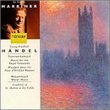| All Artists: Hans Hotter, Ludwig van Beethoven, Otto Klemperer, Christa Ludwig, Philharmonia Orchestra of London, New Philharmonia Orchestra, Daniel Barenboim, Aase Nordmo Lovberg, Aase Nordmo-Løvberg, Waldemar Kmentt Title: Beethoven: The Complete Symphonies and Piano Concertos Members Wishing: 0 Total Copies: 0 Label: EMI Classics Release Date: 11/7/2000 Album Type: Box set, Limited Edition, Original recording reissued Genre: Classical Styles: Opera & Classical Vocal, Ballets & Dances, Ballets, Chamber Music, Forms & Genres, Concertos, Theatrical, Incidental & Program Music, Historical Periods, Classical (c.1770-1830), Modern, 20th, & 21st Century, Instruments, Keyboard, Symphonies Number of Discs: 9 SwapaCD Credits: 9 UPCs: 724357389525, 724357389556 |
Search - Hans Hotter, Ludwig van Beethoven, Otto Klemperer :: Beethoven: The Complete Symphonies and Piano Concertos
 | Hans Hotter, Ludwig van Beethoven, Otto Klemperer Beethoven: The Complete Symphonies and Piano Concertos Genre: Classical
Otto Klemperer's Beethoven is one of the towering achievements in the history of recordings. By today's standards, these performances are hopelessly old-fashioned: dark, heavy, and frequently very slow. But they are also t... more » |
Larger Image |
CD DetailsSynopsis
Amazon.com essential recording Otto Klemperer's Beethoven is one of the towering achievements in the history of recordings. By today's standards, these performances are hopelessly old-fashioned: dark, heavy, and frequently very slow. But they are also the grandest, most unsentimental, most purposeful versions in the catalog. In addition, the relatively slow tempos (only in the fast movements--the slow ones are pretty swift) and forward wind balance permit more detail to be heard than in most original-instrument performances. At budget price and with the entire piano concerto cycle thrown in for good measure, this is greatness incarnate. --David Hurwitz Similarly Requested CDs
|
CD ReviewsThe Truth - but not the Whole Truth R. C. Ross | Birmingham | 01/16/2003 (5 out of 5 stars) "Klemperer's way with Beethoven is nothing if not honest. By the 1950's Otto Klemperer drew his written signature with a bold, truculent hand, the letters shaky but defiant. He had endured much. That signature and these Beethoven performances reveal the same spirit - an essential honesty. These are bold, defiant, trenchant and experienced performances. They represent essential aspects of Beethoven's genius. Dylan Thomas's pleaded that his father should `rage against the dying of the light'. Beethoven did so. So too did Klemeperer. He rages through these symphonies. Despising superficiality, he scorned a polished, refined orchestral sound. The Philharmonia respond with bold, rugged, trenchant strength. The conductor's hand and beat were in the last years notoriously shaky but the spirit utterly secure, defiant in adversity. Klemperer's vision is expressed with a defiant, trudging gait, firmly grasped priorities, unbending pride, prominent woodwind, violins divided right and left, thundering timpani in Eroica's the last page, blazing trombones in the finale of the 5th, a galumphing rustic peasant dance in the `Pastoral' (Klemperer insisted this was a slow Austrian county dance). It is fashionable to prefer early versions of the 3rd, 5th and 7th and the `live' recording of the 9th but the recordings included in this set are quintessential Klemeperer. They represent something elemental, undeniable. Comparison with Klemperer's contemporaries uncovers fundamental differences of personality. Klemperer lacks the beauty and grace of Bruno Walter's vision; the deep peace and equilibrium radiating from Ferencsik's pacific performances; the athletic dynamism that drives Carl Schuricht's. But Klemeperer convinces by patent honesty, stubborn faithfulness to essential aspects in the physiognomy of Beethoven's spirit. Indispensable!" An essential collection Andrew R. Weiss | Raleigh, NC USA | 04/24/2007 (5 out of 5 stars) "How best to describe Otto Klemperer's perspective on Beethoven's symphonies: grand, heroic, intense, insightful, stubborn, obstinate, detailed, dramatic, monumental, granitic, deeply emotional, never sentimental. This boxed set of the complete symphonies and concerti embodies all of these elements as stands as one of the great achievements of recorded music. These performances were recorded with the Philharmonia Orchestra at its peak, in the sumptuous acoustics of Kingsway Hall in London and in fine and detailed sound, and mostly in the mid-1950's during one of the brief charmed periods of Klemperer's life. EMI's impresario Walter Legge had made him permanent conductor of the Philharmonia, and when Klemperer embarked on this project in his 70's, he was in relatively good mental and physical health (Klemperer could show symptoms of manic depression and survived many health crises - brain tumor, broken bones, paralysis - which would have stopped most people). By this time Klemperer had slowed the tempi of the fast movements of the Beethoven symphonies (listen to his early 1950's recordings of the 5th and 6th on Vox to hear by how much). This tendency is more pronounced in these studio recordings than in the live performances which were recorded during that era. The slowness is mostly saved by Klemperer's use of "sprung" rhythms, which keep the slow tempi from feeling laggardly. Klemperer's earliest recordings in this series - symphonies 3, 5 and 7 - predated stereo. He rerecorded all three of these symphonies in stereo, but those recordings were made after he burned himself by falling asleep while smoking in bed. All three performances feature slower tempi than the earlier ones (whether this was the conductor's preference or the result of physical incapacity is open to conjecture). In particular, the rerecorded 7th suffered from lax phrasing, inattentiveness and perverse tempi. That is NOT the version contained in this set: fortunately, EMI had simultaneously recorded the earlier (mono) version of the 7th in "experimental" stereo, and it is that earlier version which is released here (the "experimental" stereo is remarkably good, by the way). The versions of the 3rd and 5th are the rerecorded stereo ones. You will find no finer studio versions of the 2nd, 4th, 6th, 7th or 8th. All are insightful, beautifully detailed and powerful. The 2nd clearly looks forward to the 3rd and not back toward Hayden, the 4th is boisterous and vital, the 6th bucolic and sumptuous (not a quality normally associated with Klemperer), the 7th gains in drama what it loses in swiftness and lightness, and in the 8th in particular we see the conductor's empathy to Beethoven's sense of humor. Klemperer had a deep affinity for the "Eroica", and the rerecorded version here, while slower than the 1955 recording, was dubbed by "High Fidelity"'s Harris Goldsmith (no Klemperer fan, he) as "the best Eroica going slow" and is a monumental masterpiece (the second movement is shattering). The 1st, while leisurely, is a lovingly crafted. That leaves the 5th and 9th. There is no doubt in my mind that the earlier, mono 5th is superior to the remake in this set. We lose that sense of an inevitable onslaught, especially in the outer movements. And the 9th, while similar in conception to the live versions recorded around the same time (on Testament with the Philharmonia and on Music&Arts with the Concertgebouw), suffers from diffuse sound and occasional lack of focus. I emphasize that these recordings of both symphonies are still head and shoulders above most of the competition; we're talking about different levels of greatness here. Are there superior Klemperer recordings of these symphonies? Yes; but all are live, and despite the relatively good reprocessed sound, they don't reveal the same level of detail that these studio recordings do. Klemperer was a very different conductor in front of an audience, and there is more vitality and drama in the live versions of the 3rd (Testament, with the Danish Symphony), 6th 7th and 8th (Music&Arts with the Concertgebouw) and the 9th (see above). Music&Arts' set of the complete symphonies, recorded live in Vienna in 1960, is long out of print and had cramped sound with poor detail - a supplement to this set, not a replacement. As to the piano concerti: they are better than one might expect. Barenboim, although steeped in the Germanic performance tradition, is more naturally aligned with the Furtwangler and Edwin Fischer than with Klemperer. However, the two of them actually work together extremely well and this is a fine, insightful set. Any complete cycle of Beethoven, symphonies or concerti, will have drawbacks. There will be unevenness in the performances, as there are here. But there are advantages to hearing one musician's perspective on the works, especially when (as here) the performer has depth of understanding, integrity of vision, and a structural understanding of the pieces. The digital remastering is excellent and the sound barely shows its age. This may not be your only complete set of Beethoven's symphonies, but it should be one of them. And at a price this low, it's a bargain too." Grab it while it's available! R. Q. Hofacker Jr. | Basking Ridge, NJ USA | 12/27/2001 (5 out of 5 stars) "When I read such comments as "hopelessly old-fashioned, dark,
heavy, and frequently very slow," I can't believe your reviewers heard the same recordings I did. This nine-CD album is an astonishing achievement and a wonderful contribution to the recording legacy of Otto Klemperer and the Philharmonia (or New Philharmonia after 1964). Any lover of classical music should immediately order this set while it is still in the catalog. Please ignore the carping by some critics that Klemperer indulges in "impossibly slow tempos." These people ignore the fact that Klemperer often delivers quite brisk tempi when it suits his interpretation of the score. Perhaps such critics prefer to hear every classical piece performed at precisely the metronome setting they feel matches the tempo markings of the composer, but that could result in every recording of a work sounding the same. Klemperer was a maestro who knew what he wanted, and he made sure his orchestra knew it as well. His output with the Philharmonia and New Philharmonia included numerous major works ranked by prominent critics as among the "great recordings of all time." Sure, there are other conductors with faster, even MUCH faster, versions of the Beethoven symphonies and concerti and overtures. Sir Georg Solti and William Steinberg come to mind, and some critics hated their performances for being TOO fast. But there are others even slower than Klemperer's slowest passages. I have numerous versions of the Beethoven symphonies and piano concerti (LP and CD) in my collection, and I enjoy the differences in approach of such conductors as Solti, Ashkenazy, Karajan, Boehm, Kleiber, Furtwangler, Toscanini, Monteux, Stokowski, and others, even when accompanied by groans, moans, and occasional editing of the scores. But I challenge anybody to identify a more majestic set of Beethoven symphonies and concerti than this Klemperer album. I want especially to compliment the five piano concerti (featuring Daniel Barenboim as soloist). The sound of these performances is markedly superior to the original vinyl records, and the tempi are definitely not a drag. Add to that the inclusion of the three Leonore overtures and the various other pieces, and you have an amazing value as well as superb performances. The only things I would have liked to add are the Violin Concerto (with Yehudi Menuhin as soloist)and the Fidelio overture. Incidentally, for those enthusiasts of vinyl records, let me add that the CD sound (remastered with 24-bit technology) is every bit as good, and often better than those Angel records, and there are no unfortunate breaks in movements, such as in the second movement of the Angel LP of the "Eroica" symphony." |

 Track Listings (9) - Disc #1
Track Listings (9) - Disc #1



